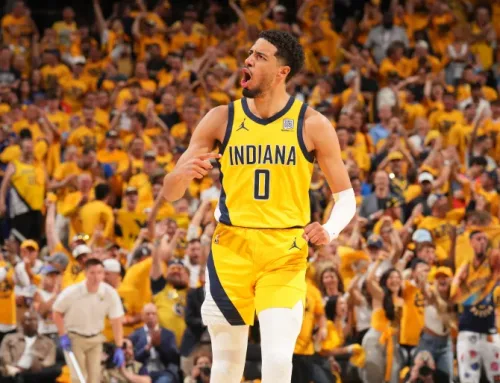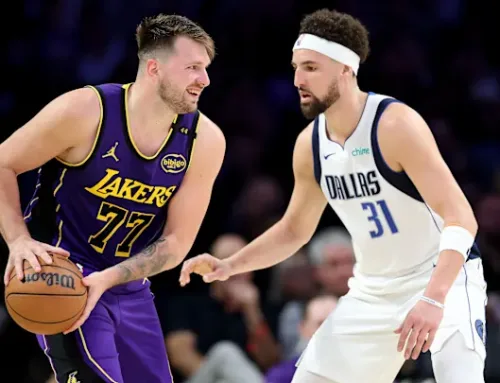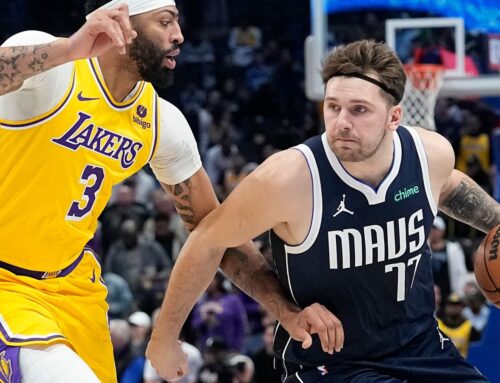The Upstart Cavs Announce Themselves
By: Avi Tyagi
A regime denounced for a variety of hit and miss desperation swings capitalized on its 2 highest picks to produce a truly enticing long-term core. With their sneaky interjection into the Harden deal to acquire Jarrett Allen, the Cavaliers built a defensive stalwart and increased their upside further. And here is their crescendo. At a time when the GMs making preseason roster maneuvers typically reside in the NFL, the Cavaliers announced themselves on the center stage.
Before this deal, the blossoming Cavs still faced inherent potential hurdles. Most notably: roster fit. Lauri Markkanen performed admirably as a 3 when called upon. Collin Sexton averaged 25.5 points per 75 possessions (24.3 points a game for those wondering) on league-average true shooting. That’s not nothing; these are young, talented players. Dig even slightly past that and the fit concerns appeared glaring. Markkanen performing admirably out of his comfort zone is valuable. By most accounts, he could be considered an average rotation forward. His prowess from 3 was a key factor behind the 3-bigs lineup. With the usage and role on this team however, Lauri profiled more as a floor-raiser for a prospective playoff team than a true cornerstone for a future contender. His perimeter defense was juuuuust good enough in a regular season domain with Mobley and Allen crushing opponent’s ambitions behind him. In a playoff setting or against a high-level contender in the regular season, Markkanen still provided a glaring advantage for opponents to take advantage of. The fifth starter on this roster ideally would be a lower-usage offensive profile headlined by a mix of 3-point volume and accuracy. Defensively, acceptable perimeter footspeed, consistent attention to detail in transition, and the capacity to guard the spectrum between the 2 and 4 would be valued. The value of Markkanen’s shooting was diminished at a position with higher 3-point attempt rates and more shot versatility without tapping into any nascent strengths defensively. With Collin Sexton, the fit concerns may have been even more substantial.
Collin Sexton might best explain the shifting paradigms at the guard spots. As wings and bigs become more skilled at perimeter actions and 3-point attempt rates climb year-over-year, the weaknesses of small guards shines brighter than ever. Small guards without the stoutness to hold up on switches have become a dangerous proposition in a more defensively dynamic league. The guards able to minimize these concerns are the best half-court passers or the uber-efficient high-volume scorers. The throughline connecting almost all of these guards is a need to shoot the 3 often and proficiently. Sexton is the outlier in every regard. He may be the best guard in the league who fills absolutely none of these archetypes. If anything, his defensive concerns and passing blind spots are sharper concerns than most guards. In total, they nullify a lot of the positive effects of his prolific scoring. His best value comes from on-ball scoring, but without the passing, he might not justify them. He’s a dominant paint presence with an eye for attacking the rim, but he’s not the best lob passer and so his attacks actually minimize the effects of most non-shooting big men. Defensively, he can’t be played alongside any other defensive liability, but especially in the backcourt. All of those caveats severely affected his value proposition for the Cavs specifically, despite being a 30% usage offensive player on league-average efficiency. A trade to Utah (a team with no established infrastructure after the teardown and plenty of opportunities to continue to develop) may showcase his strengths in more ways than the Cavs ever could. On a deal synonymous with 6th man material with the new cap deal peering out over the horizon, he might become an excellent trade piece for the Jazz going forward. For the Cavs, the returning star is meant to fill the gaps between their best players and nullify many of their roster construction concerns.
The main component of the trade, aside from the healthy heaping of picks is, of course, Donovan Mitchell. In some ways, he may have the most to prove of any player this offseason. When Mitchell entered the league, his scouting profile highlighted a potential 2-way force with defensive playmaking adroitness. Last season, he was been abhorrent defensively, after slowly regressing year over year. With Garland (a true star point guard with a heavy usage who should likely be commanding the lion’s share of touches) partnering with him in the backcourt, Mitchell must adapt to create team success. The Cavaliers have formulated a 2-year bet that they can convince Mitchell to stay before his next extension/free agency choice becomes a talking point. The question: How eagerly will they want him to stay? Mitchell at his best might possess a first-team All-NBA upside. He’s an above-average distributor from the shooting guard passer who can notably thrive off-ball (see Jazz three guard sets). He’s an excellent pull-up 3 point shooter at an expansive scale and has shot 40% on a sample of over 1000 3s over the last 5 seasons. He’s a theoretically capable defender, with the size, speed, and weight profile to profile as above-average. His best strength overall might be his capacity to drive to the hoop and finish with crafty euros or explosive one foot leaps into shotblockers. He needs to put everything together. On a team with Garland, the shot selection needs to improve and catch and shoot 3s need to become a staple of his game. The defense cannot continue to be horrendous. Most importantly, some of his most difficult layups need to be converted into lobs or dumpoffs to a member of the Mobley-Allen tandem. Those simplifying modifications with the current Cavs’ infrastructure may be enough to immediately vault him into Second-Team All-NBA status. Usage and efficiency do not always follow a simple curve, but, in this case, there are avenues for Donovan to do so. Just because Donovan can, does not mean he always should. Following that principle might unlock a better version of Donovan and optimize what may potentially be the most tantalizing 4-man core in the league.
I say 4-man core for a reason. The small forward spot is a complete mystery. Most of the roster now makes sense together, save for two names: Dylan Windler and Caris LeVert. Windler just won’t get any minutes for a team with the ambitions the Cavs now have and LeVert appears to be the most likely next man out by the day. With Mitchell on the roster, his skillset becomes entirely redundant. He’s never been particularly efficient from any part of the court and his overall defensive profile is exploited exponentially more when he shares the court with another weak defender. His positional size allows him to hide or minimize any advantages when he is the only target, but when there’s nowhere to hide, he get diced up on the perimeter and especially in transition. His key strengths remain the same: he can generate drives at a 90th percentile rate, demonstrates smooth ballhandling skills as a big guard, and is a viable passer to kickout shooters. It’s just hard to find any fits for a player with that profile with career figures of 52.5% true shooting and 33% from 3. I managed to generate one potential deal: Alec Burks, Corey Joseph, and Hamidou Diallo for Caris LeVert, Dylan Windler, a 2023 2nd (more favorable of the Cavs/Warriors) and a 2027 Cavs 2nd. A healthy Burks would likely function as an effective 5th starter. He can space the floor (career 38% from 3), actually handled the brunt of the Knicks perimeter responsibilities last season with Bullock’s departure, and adds some of that same secondary passing as LeVert. Joseph would be an acceptable backup point guard behind Garland while Rubio rehabs. He’s an acceptable defender who could fit with Mitchell in staggered bench lineups. Diallo would be an athletic aviator to add more explosive pop and rim pressure to a roster lacking in those regards from their perimeter players (only Mitchell adds that element to the current roster). Against other benches, he might qualify as a plus defender as a 3, which might unwrap more roster flexibility. Importantly, none of these additions would cost the Cavaliers anything against next year’s cap if they so choose. Diallo and Joseph would become unrestricted free agents and Burks has a 10.5 million team option. The Cavaliers would be able to evaluate each player and keep the best options at likely reasonable contracts. It would help maintain a clean cap sheet for 2023-24, the point at which only the core 4, Okoro, and Rubio would be under contract. Because Burks was part of another deal, he is only allowed to be aggregated in a deal with other players after September 9, which may be why this deal has not already happened. The Pistons might actually need a 6th man ballhandler and another consistent rim threat to pair with Cade in certain settings. With the Pistons vets unlikely to resign and the Cavaliers not likely to offer LeVert or Windler an extension, a deal may make sense for both sides if pick negotiations bear fruit.




